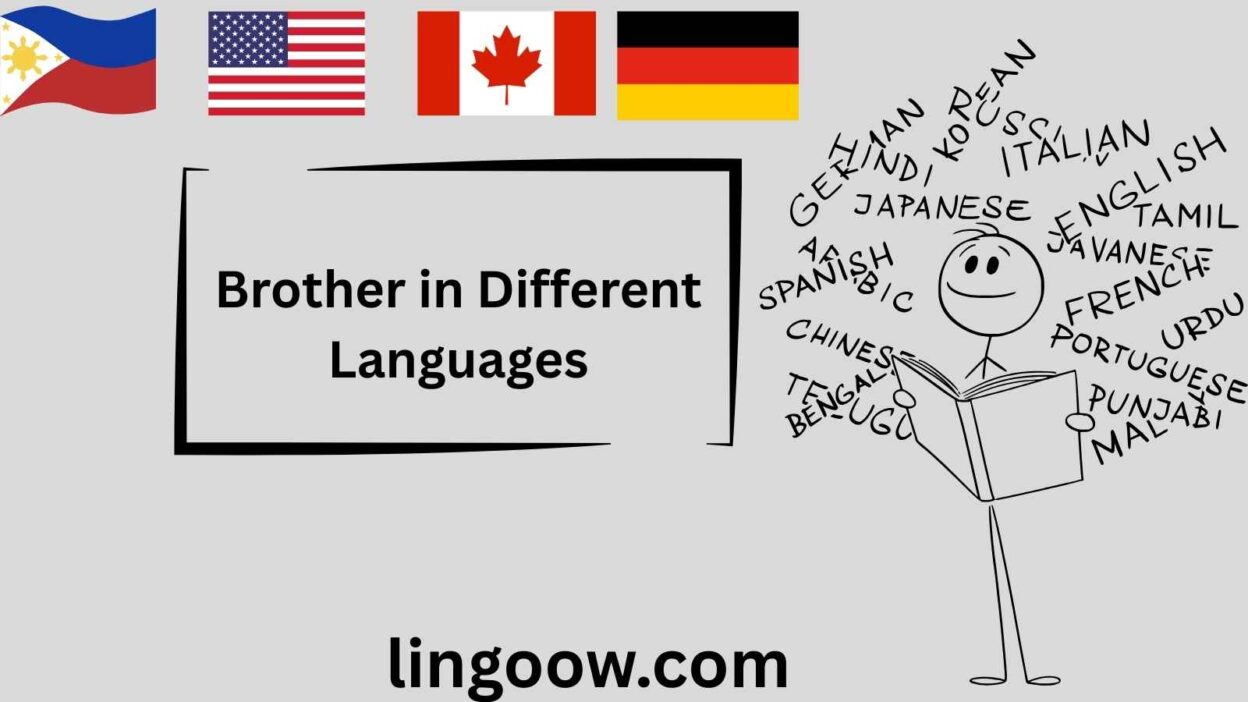The word “brother” carries a weight that transcends borders, cultures, and time. It’s more than a label for a sibling; it’s a symbol of loyalty, love, and shared history. I remember watching two young boys in a park, one shielding the other from a sudden rain, their laughter echoing as they ran for cover. It struck me how that simple act of care, that unspoken bond, is universal—whether in a bustling city or a quiet village.
Across the globe, the concept of “brother” resonates deeply, yet each culture expresses it in its own unique way, weaving stories, traditions, and values into the word. This article explores how “brother” is said in different languages, delving into the cultural nuances that make each expression special, while celebrating the universal theme of kinship that ties us all together.
Reference Table: “Brother” in Different Languages
| Language | Word for “Brother” | Cultural/Linguistic Insight |
| Spanish | Hermano | Used warmly in family and friendship contexts, often extended to close friends in Latin America. |
| French | Frère | Evokes a sense of camaraderie, as in “fraternity,” and is used in both familial and social contexts. |
| German | Bruder | Rooted in Old High German, it reflects a strong sense of familial duty in German-speaking cultures. |
| Italian | Fratello | A term of endearment, often used in religious or communal settings to denote brotherhood. |
| Mandarin | Xiōngdì | Literally “elder/younger brother,” it reflects hierarchical family roles in Chinese culture. |
| Hindi | Bhāī | A versatile term used for siblings and close friends, symbolizing trust and protection. |
| Japanese | Ani (elder), Otōto (younger) | Distinguishes between older and younger brothers, emphasizing respect for age hierarchy. |
| Korean | Hyeong (elder), Dongsaeng (younger) | Reflects Korea’s emphasis on age-based respect, even within sibling relationships. |
| Arabic | Akh | A term of deep emotional connection, used in familial and religious contexts across 20+ countries. |
| Swahili | Ndugu | Means “relative” or “brother,” symbolizing community and shared responsibility in East Africa. |
| Zulu | Umfowethu | Emphasizes familial bonds and mutual support in South African Zulu culture. |
| Yoruba | Ẹgbọ́n (elder), Àbúrò (younger) | Reflects Yoruba’s respect for age hierarchy, used widely in Nigeria and Benin. |
| Maori | Tungāne | Represents a protector in Maori culture, tied to tribal and familial loyalty in New Zealand. |
| Hawaiian | Kaikunāne | Evokes a sense of shared heritage and aloha spirit in Hawaiian family structures. |
| Cherokee | Dinikanvdi | A term rooted in Cherokee kinship systems, emphasizing community and clan ties. |
European Languages
In Europe, the word for “brother” often carries historical and cultural significance, reflecting both familial and societal values. In Spanish, “hermano” is a warm term, frequently used beyond family to denote close friendships, especially in Latin American cultures where community ties are strong. In French, “frère” evokes the revolutionary ideals of “liberté, égalité, fraternité,” extending the concept of brotherhood to societal unity. German “Bruder” has a stoic, duty-bound connotation, rooted in Old High German traditions of family loyalty. In Italian, “fratello” is not only a familial term but also a religious one, often used in Catholic contexts to signify spiritual kinship. Across these languages, “brother” reflects a balance of personal affection and cultural ideals of unity, shaped by Europe’s history of community, religion, and social movements.
Asian Languages
Asia’s linguistic diversity offers a fascinating lens into how “brother” is expressed across its many cultures. In Mandarin, “xiōngdì” distinguishes between elder (“gēge”) and younger (“dìdi”) brothers, reflecting China’s Confucian emphasis on family hierarchy. This distinction is mirrored in Japanese with “ani” (elder) and “otōto” (younger), where respect for age shapes familial roles. Korean uses “hyeong” for an older brother and “dongsaeng” for a younger sibling, a structure that underscores Korea’s age-based social etiquette. In Hindi, “bhāī” is a versatile term, used not only for siblings but also for friends or respected peers, embodying India’s communal spirit. In Arabic, spoken across over 20 countries from Morocco to Iraq, “akh” carries deep emotional weight, often used in religious contexts to signify spiritual brotherhood in Islam. These variations highlight Asia’s intricate blend of hierarchy, respect, and communal bonds.
African Languages
Africa’s linguistic landscape is as diverse as its cultures, and the word for “brother” reflects deep communal values. In Swahili, spoken across East African countries like Kenya, Tanzania, and Uganda, “ndugu” means both “brother” and “relative,” emphasizing the collective nature of family and community. Zulu, prevalent in South Africa, uses “umfowethu,” a term that conveys mutual support and shared identity within the clan. In Yoruba, spoken in Nigeria and Benin, “ẹgbọ́n” (elder brother) and “àbúrò” (younger brother) reflect the cultural importance of age and respect, with siblings often playing protective roles. Across over 20 African countries, from Ethiopia (Amharic: “wendim”) to Ghana (Twi: “nua”), the concept of “brother” often extends beyond biology to include community members, reflecting Africa’s strong tradition of collective responsibility.
Indigenous & Island Languages
Indigenous and island languages offer unique perspectives on “brother,” often tied to tribal and communal identities. In Maori, spoken in New Zealand, “tungāne” signifies a male sibling but also a protector within the whānau (extended family). Hawaiian “kaikunāne” reflects the aloha spirit, emphasizing familial harmony and shared heritage. The Cherokee term “dinikanvdi,” used in Native American communities, underscores clan-based kinship systems where brothers share responsibilities within the tribe. In Samoan, spoken in Samoa and American Samoa, “uso” is a powerful term for brother, symbolizing loyalty and mutual support in Pacific Island cultures. Across over 20 indigenous and island communities, from the Inuit (“anguti”) to the Tongan (“tokoua”), “brother” often embodies a protector or partner within tightly knit communities, reflecting their emphasis on collective survival and cultural preservation.
Cultural Insights
The word “brother” has evolved over centuries, shaped by historical, religious, and social forces. In ancient civilizations like Mesopotamia, terms for “brother” were tied to tribal alliances, as seen in Akkadian texts. In Christianity, “brother” gained spiritual significance, as in the Bible’s use of “brethren” to denote fellowship. Islamic traditions, particularly in Arabic-speaking regions, use “akh” to signify both familial and religious bonds, rooted in the Quran’s emphasis on brotherhood. In Confucian societies like China and Korea, the distinction between elder and younger brothers reflects hierarchical values dating back millennia. Across cultures, “brother” has shifted from a strictly familial term to one that encompasses friendship, community, and even revolutionary ideals, as seen in Europe’s Enlightenment-era focus on fraternity. This evolution highlights how the concept of brotherhood adapts to cultural priorities while retaining its emotional core.
Proverbs
Proverbs and sayings about “brother” reveal universal truths and cultural nuances:
- Spanish: “Hermano que ayuda, hermano que salva.” (A brother who helps is a brother who saves.) – Emphasizes the protective role of siblings in Hispanic cultures.
- Arabic: “Al-akh shāqiq al-nafs.” (A brother is half of the soul.) – Reflects the deep emotional bond in Arab traditions.
- Swahili: “Ndugu ni nguvu, mgawanyiko ni udhaifu.” (Brothers are strength, division is weakness.) – Highlights unity in East African communities.
- Chinese: “Xiōngdì rú shǒuzú.” (Brothers are like hands and feet.) – Suggests the indispensable nature of siblings in Chinese culture.
- Maori: “He tungāne, he toa; he whānau, he kaha.” (A brother is a warrior; a family is strength.) – Ties brotherhood to courage and tribal unity.
These sayings underscore the global reverence for brotherhood as a source of strength, loyalty, and unity.
FAQs
Why does the word for “brother” sound similar in many languages?
Many languages share linguistic roots, such as Indo-European languages (e.g., “frère” in French, “fratello” in Italian) derived from Latin “frater.” Similarly, Semitic languages like Arabic and Hebrew share “akh” due to common ancestral roots.
What is the oldest known usage of the word “brother”?
The concept appears in ancient texts like Sumerian cuneiform (circa 3000 BCE), where terms for sibling relationships were recorded, and in Proto-Indo-European roots like bhrāter, which evolved into words like “brother” and “frater.”
How do cultural differences affect the expression of “brother”?
In hierarchical cultures like Japan and Korea, terms distinguish between elder and younger brothers, reflecting respect for age. In collectivist societies like those in Africa, “brother” often extends to community members, emphasizing unity over individuality.
Conclusion
The word “brother” is a universal thread, weaving through languages and cultures to tell a story of connection, protection, and love. From the warm “hermano” in Spanish to the hierarchical “hyeong” in Korean, each term carries a unique cultural fingerprint, yet all point to the same truth: the bond of brotherhood transcends borders. Whether it’s a Maori warrior standing by his tungāne or an Arabic akh offering spiritual support, the concept resonates with a shared human experience. I invite you to reflect on what “brother” means in your language or culture—share your stories in the comments below or tell us how this word shapes your relationships. Let’s celebrate the global language of kinship together.




